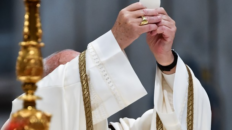

It was built by order of Venezuelan president Luis Herrera Campins on a 4,752-foot high plateau called “Peña de la Virgen” (Rock of the Virgin), where it is said the Virgin Mary appeared in 1570. According to the tale, a young woman was walking down the streets in the village of Carmona to buy candles.
A group of men approached her asking: “Why are you walking alone?” to which she replied “I am not alone, I am with God, the sun and the stars” or, according to other versions, “Brothers, don’t forget I am walking with God, my protector.” The men then followed her as she went to hide behind some rocks, and realized her true identity.
Much like the Statue of Liberty, the Virgin of Peace can be visited from the inside with its five enclosed balconies offering a spectacular view of the surrounding tropical forest.
Both monuments are rich in symbolism. The Statue of Liberty represents Libertas, the Roman goddess of freedom, holding a torch above her head with her right hand and a table on her left inscribed with Roman numerals JULY IV MDCCLXXVI (July 4, 1776), which is the date of the U.S. Declaration of Independence.
The “Virgen de la Paz” was inspired by the Virgin of Our Lady of Peace, which has been the spiritual patron of Trujillo since 1568 and of the local diocese since 1960. She holds a white dove in her right hand, which stands as a symbol of peace on earth.
The statue also holds another record, that of the tallest representation of Mary around the world. Despite its colossal size and its strong evocative symbolism, it does not attract as many visitors as other tourist locations in the country.







Add comment